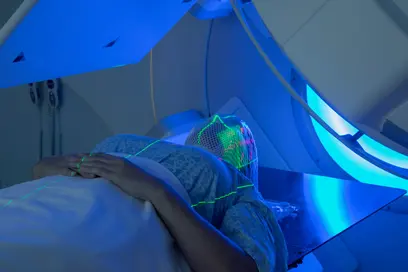According to current upper limit values*, thirty-five million Germans have high blood pressure (hypertension). Many hypertension patients need to take antihypertensive drugs over decades. Among such drugs are beta blockers, which are prescribed for millions of patients to treat hypertension and heart conditions. Germany’s statutory health insurances alone refund 2,255 million daily doses of these substances every year.
Some researchers have postulated that beta blockers might lower the risk of cancer. This theory was derived from laboratory experiments which show that the stress hormone noradrenaline (norepinephrine) promotes the growth and spread of cancer cells. Beta blockers inhibit the effect of this signaling molecule. “For such a widely used drug, it is also important to thoroughly explore the effects it might have on cancer risk," says Dr. Michael Hoffmeister of DKFZ. “Even slight changes in the risk resulting from these substances would have a strong impact on public health."
In their “DACHS" study, Hoffmeister and colleagues have thoroughly searched for proofs for such a connection. Between the years of 2003 and 2007 they interviewed 1,762 colorectal cancer patients and 1,708 people who were not affected by cancer in the Rhine-Neckar-Odenwald region. The investigators asked which particular drug was taken and for how long, and questioned participants about their medical history, overweight and lifestyle factors such as alcohol and cigarette consumption.
They did not find any evidence suggesting that beta blockers lower the risk of colorectal cancer, not even if taken over many years. There was also no evidence of any risk reduction for individual substances of this class of drugs, nor did the researchers find any connections with tumors in specific parts of the bowel.
When the investigators related tumor stage distribution with intake of antihypertensive drugs, they did indeed find a risk elevation for advanced tumors (stage IV). However, this finding still needs to be confirmed by further studies, because case numbers for these tumor stages were low.
“One of the strengths of our study is that we have thoroughly asked for all kinds of disturbing factors and we have adjusted results accordingly," Michael Hoffmeister explains. The researcher describes the pitfalls that can lead to what seem to be connections. “For example, participation in colorectal cancer screening lowers the risk of a tumor, because potential cancer precursors are directly removed during the examination. And hypertension patients may simply tend to go to the doctor more often, and the doctor points out cancer screening to them."
*According to the German Hypertension League, blood pressure values over 140 / 90 mm Hg are classified as hypertension.
Lina Jansen; Janina Below; Jenny Chang-Claude; Hermann Brenner and Michael Hoffmeister Beta Blocker Use and Colorectal Cancer Risk - Population-Based Case-Control Study. Cancer 2012, DOI: 10.1002/cncr.26727



